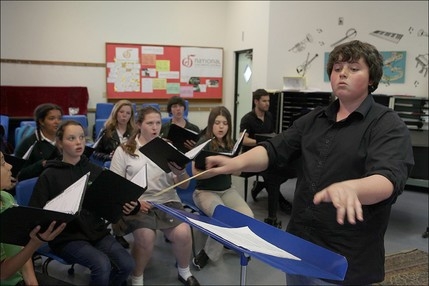
BROAD STAGE — Those who filled the seats of the Broad Stage last week at the National Children’s Choir performance of “Journey of Song” expected to watch youth sing.
They anticipated the cherubic voices of the performers in their early teens with some experience with the ensemble, and the nervous fidgeting of youngsters whose discipline had run its course by intermission like the stamina of a first-time participant in an Ironman competition.
Their eyes scanned over the program, noting the bookend dates guarded with parentheses that gave temporal reference to the composer responsible for each work piped out in piercing sopranos.
But they missed one. It read (1998 — ).
For the first time, Friday, the choir performed an original composition written by one of its own, 13-year-old Joss Saltzman, and conducted by his peer, 14-year-old Gabriel Emerson Segan Ziaukas.
The piece, called “Dawn,” was submitted as part of a competition open to all university students in Southern California meant to inject vitality into youth chorus by inviting a steady flow of original works ready for performance.
Youth chorus needed to be thought of not as an adjunct to the adult version, a holding pen until one’s talents are honed and the voice perfected, said Luke McEndarfer, the artistic director for the chorus.
“It’s an art of its own,” he told the audience, and as such needed fresh works.
When the call went out, the submission box was flooded with young hopefuls seeking a chance to see their piece performed on the famed stage. McEndarfer selected one, an 11-part libretto by 23-year-old Daniel French, and that would have been the end of it if Saltzman hadn’t approached him with “Dawn.”
“I didn’t know that I wasn’t qualified by my lack of university education,” the slim youth told the audience, provoking startled laughs from a group still shocked that the articulate youth was singer, soloist and composer.
McEndarfer was on a cross country trip — “Somewhere between Colorado and one of those other states in the middle” — when he finally paused to look at the music.
The effect was instantaneous.
“I knew we had to do it,” he said.
After McEndarfer returned to California and began rehearsals, it also became clear to him that if a student’s work would be performed, a student must be holding the baton.
McEndarfer selected Ziaukas, an energetic member of the conducting fellowship program that McEndarfer runs to teach select members of the chorus the intricacies of guiding a group of musicians through a piece.
Ziaukas, a soloist with the chorus and first-chair violinist with his school, accepted the assignment with relish.
Playing instruments is one thing, he said, but the conductor gets to play a choir.
“I move my hands, and I can communicate something worldwide,” he said. “As a musician I can play the piece as it’s supposed to be played. As a conductor, I can make the piece shine.”
Ziaukas went home immediately and began practicing in front of the mirror.
He and Saltzman spent weeks working through the details of the music, shaping it in step with their respective visions of what “Dawn” could be.
It helped having the input of a living, present composer rather than making hopeful interpretations of a dead musician’s intent, Ziaukas said.
“Working with Joss was a godsend,” he said.
The two young men speak of the piece, and music in general, in similar terms.
Both evoke the universality of music as a language that connects disparate cultures like a common heartbeat.
“(Music) holds the key to people becoming not citizens of one nation but citizens of the entire world, citizens of the common ground,” Saltzman said.
The piece, performed by 80 members of the choir, was the most complicated work Ziaukas had ever conducted, and the only choral piece that Saltzman has written.
The rest of Saltzman’s work tends more toward pop music, some of which will be recorded in his first album in coming months.
“I think that these opportunities are definitely great opportunities to have, but not my main focus,” he said. “The departure is rewarding because I can see what the other side is like.”
“Dawn,” composed, conducted and performed by members of the National Children’s Choir, elicited a standing ovation from the audience, which was swept away by the joy and hope that permeated the piece.
It was everything McEndarfer was hoping for.
“I think that it was a special chemistry of elements with this work,” McEndarfer said. “There was a synergy between (Ziaukas), the composer, the audience and the students as they were creating the music. Every element was coming through the students. It created a special feeling that another conductor wouldn’t have had.”
ashley@www.smdp.com








